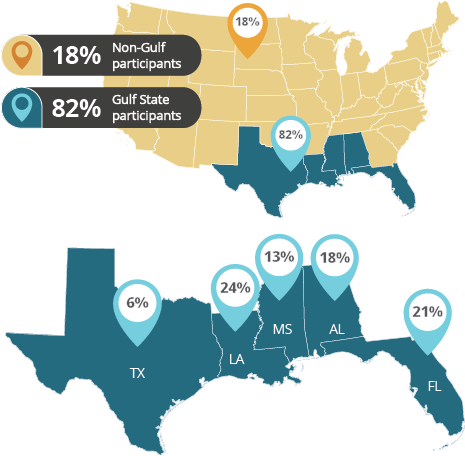Nearly 33,000 participants joined the GuLF STUDY to help answer health questions that matter to clean-up workers and affected communities.
People from across the U.S. and from all walks of life came together to clean up the coast after the Deepwater Horizon oil spill. Study participants, who represent the full range of oil spill clean-up responders, generously gave their time to answer in-depth questions about their experiences during the spill and their health. Many participants also allowed us to visit their homes to collect blood and other samples. The willingness of participants to join the study and share their stories has helped make the GuLF STUDY the largest and most comprehensive study ever conducted on the potential health impacts of an oil spill.
About 82% of study participants live in the five Gulf coast states, but 18% come from across the US.

Study participants represent the full range of diversity among clean-up workers and volunteers. Some characteristics of participants include -
| Male | 81% |
| Under the Age of 45 at Enrollment | 56% |
| Racial Minorities | 36% |
| Married | 56% |
| Less than High School Education | 16% |
| Low Income | 26% |
| Served in the Military | 24% |
Job Categories of Workers Enrolled in the GuLF STUDY
| Category | Full Cohort N = 32,608 |
|
|---|---|---|
| N | % | |
| Did Not Work on Spill Cleanup | 7,671 | 23.5 |
| Worked/Volunteered on Oil Spill Cleanup | 24,937 | 76.5 |
| Response | 4,479 | 18.0 |
| Support of Operations | 4,371 | 17.5 |
| Clean-up on Water | 4,328 | 17.4 |
| Decontamination | 3,561 | 14.3 |
| Clean-up on Land | 3,634 | 14.6 |
| Administrative Support | 4,564 | 18.3 |
For more detailed information, go to the Reports page.



